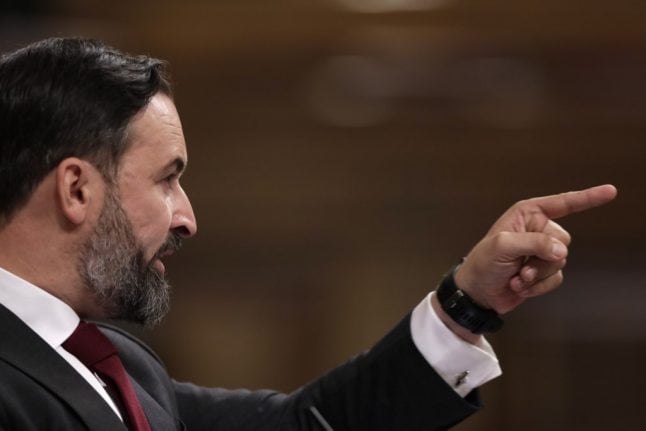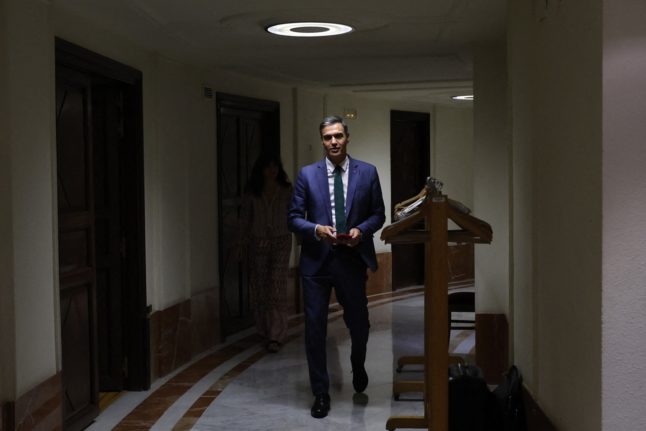For two days the Congress proceedings are set to be dominated by Vox’s much anticipated ‘motion of censure’ against the government.
A looming threat throughout the COVID-19 pandemic, party leader Santiago Abascal repeatedly dangled it over the government during the crisis and has now finally brought the motion – the Spanish equivalent of a vote of no confidence – to the House of Deputies floor on Thursday.
But what is a motion of censure? Why are Vox doing this now, amidst the second wave of a global pandemic? And what would it achieve, who would support it, and is there any realistic chance of it passing?
What is a moción de censura?
The Spanish Constitution of 1978 allows for motions of no confidence against the government if it is supported by one-tenth of the Congress of Deputies. It is a parliamentary instrument through which Congress can force the resignation of the president. It is considered a “constructive” constitutional proposal because the vote, and possible change of government, must be predicated on the basis of an alternative candidate to lead a new government.
There have been just four motions of censure in Spanish democratic history until now. The fourth, and only successful motion, was led by current Prime Minister and PSOE leader Pedro Sanchez against the PP government of Mariano Rajoy on the back of political momentum from a cash-for-contracts corruption case embroiling the government.
The motion installed Sanchez as Prime Minister and he has faced hostility from the right, both PP and Vox, since that day.
What are the legislative requirements?
The motion must be supported initially by at least 10 percent of the deputies (a minimum of 35). This censure vote has already been supported by the 52 deputies of Vox and includes Abascal as the alternative candidate for the Presidency.
Any motion against the government must outline its reasons for doing so. According to the text sent by Vox, they are:
1) “From the constitution of the current communist social government through fraud against the Spanish electorate and its dependence on the separatist political forces”
2) “From the criminal management of the pandemic of disease due to coronavirus”
3) “Of the democratic degeneration and the assault on the counterpowers called to limit the Executive Power ”
4)“ Of the unconstitutional curtailment of the rights and freedoms of the Spanish people ”.
The motion will be debated throughout Wednesday and Thursday, with expected rights of reply by both Sanchez today, and Podemos leader and Deputy Prime Minister Pablo Iglesias on Thursday.

Is it likely to pass?
Simply put: no. Vox has only the votes of its own 52 deputies. No other parliamentary group has supported the motion, including even PP. For the vote to pass, it needs an absolute majority of at least 176 deputies; numerically this would mean it needs, in addition to its own 52 deputies, the votes of all 88 PP deputies, 10 Ciudadanos, 2 Navarra Suma deputies and a smattering of support from various ERC, JxCAT and PNV representatives.
Both politically and legislatively speaking, this seems an impossible task.
There has been confusion, however, in recent weeks, as to whether PP would support the motion or not, and it was reported that PP deputies arrived for the first of the Congressional sessions this morning still unsure how they would vote – whether to abstain or vote against the motion – or even how leader Pablo Casado felt about the issue.
“They have not told anything to the deputies,” said one well known MP.
During the course of Thursday’s debate, however, it has emerged that PP will not support the motion and vote against it. Speaking on the Congress floor, PP Secretary-General García Egea branded the move “not a motion of censure, [but] a joke.”
“Its own uselessness makes it a circus show. It gives Sánchez a magnificent setting to show off,” he added, suggesting the failed motion would do nothing but strengthen the government.
Why are Vox filing the motion?
Although Vox and Abascal know the move will ultimately fail, and limit their ability to present motions to Congress for the rest of the year, the motion is the natural continuation of its populist opportunism; the culmination of months of threats and attacks on the government throughout the COVID-19 crisis. Abascal first threatened a motion of censure some months ago.
Vox and Abascal thrive on media coverage, and two days of nationally televised debates give him the chance to present himself as Spain’s true opposition party leader, to politically outmanoeuvre PP from the right and, they hope, give them a polling boost amid such political uncertainty.
Indeed, the motion of censure is perhaps best understood, politically speaking, not as a vote against the government but as a move against PP and an attempt to solidify support among more naturally centre-right voters.
In this sense it is an entirely performative gesture; the motion allows Abascal the time to project himself as a leader in waiting, bypass a comparatively inactive PP, and hit on all of his recurring populist talking points on national television.
During the debate the PP's García Egea criticised the “political opportunism” of Vox, suggesting the motion provides “a magnificent smokescreen for Pedro Sánchez… it is a shame that we are not talking about what really matters to the Spanish. Some see politics as a spectacle, the PP sees it as a solution,” he said.
The failed motion only “strengthens and polarises” the country, he added.
Yet that is exactly what Vox seeks to do, thriving in uncertainty and instability; the motion of censure, sure to fail tomorrow, is political gamesmanship and an attempt by Abascal to delegitimise PP and portray Vox as the main opposition party in Spain.
The only surety of the move is that the debate over the couple of days will intensify, that it gives Vox a louder voice, it hopes, on the centre-right, and positions itself as a player in the forthcoming months of instability as Spain attempts to recover from the COVID-19 pandemic.

Pedro Sanchez is currently defending his government’s record on COVID-19, and has urged PP not to side with the far-right and reject the motion of censure. The final vote is expected sometime tomorrow afternoon.
By Conor Patrick Faulkner
READ MORE
- What we know so far about Spain's planned four tier alert system to control coronavirus
- IN PICS: Spain hit by anti-government protests by far-right



 Please whitelist us to continue reading.
Please whitelist us to continue reading.
http://www.betvantage.co.ke
Checking if it works
https://www.betvantage.co.ke